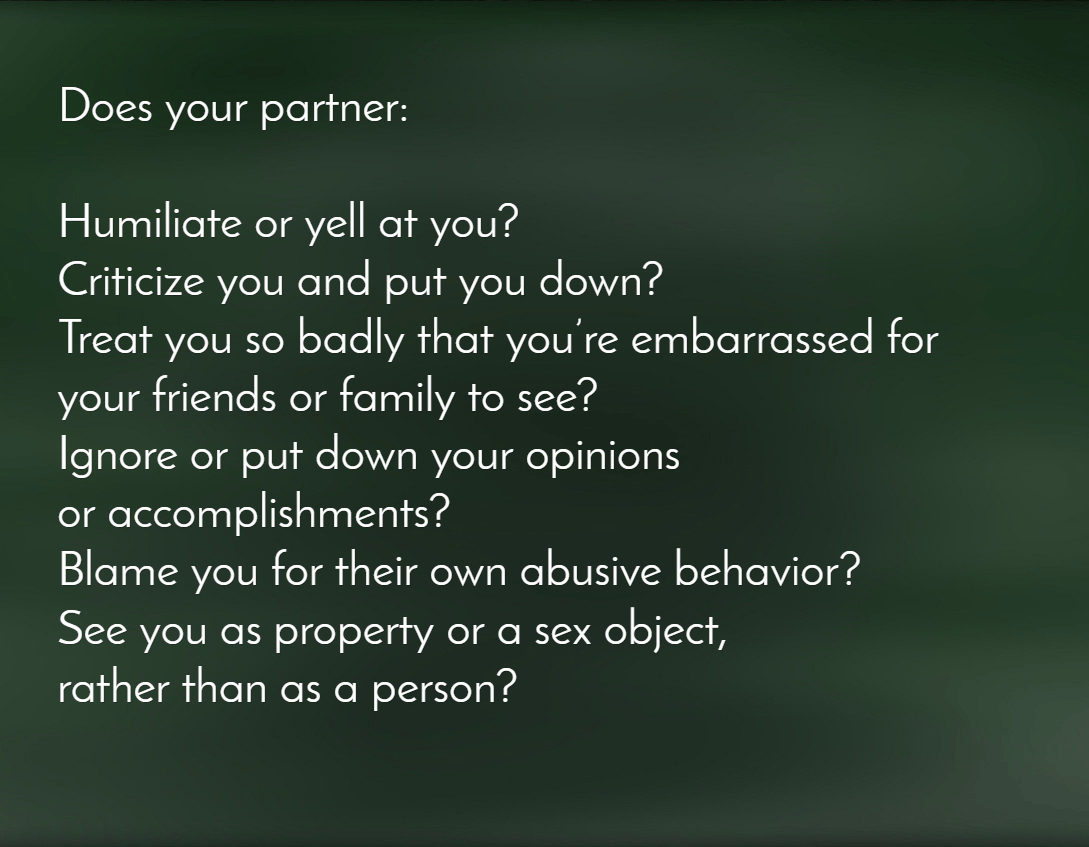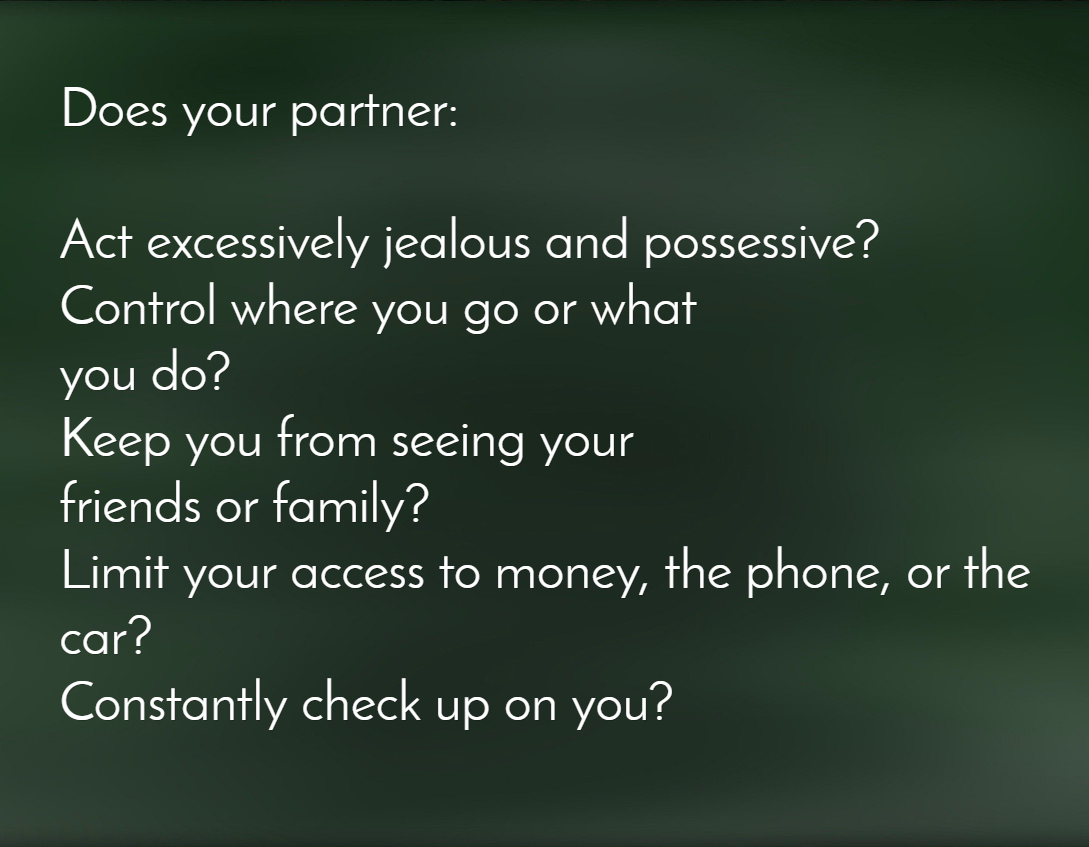Crisis Support
Violence and abuse can happen to any woman regardless of age,sexual or gender identity, race, religion, culture, ability or economic status.
Help is closer than you think.
ARE YOU IN AN ABUSIVE RELATIONSHIP?
Often the most obvious form of abuse is physical, it's also usually the easiest to identify. But the emotional and psychological consequences of domestic abuse can also be severely damaging. Emotionally abusive relationships are as destructive as being physically abused because they can destroy your self-worth, lead to anxiety and depression, and make you feel helpless and alone. Your first step to breaking free is recognizing and acknowledging the reality of your situation and then finding the help you need.
To determine whether your relationship is abusive, answer the questions below. The more "yes" answers, the more likely it is that you're in an abusive relationship. (HelpGuide.org)
HELPful Numbers
Resource Guide
CRISIS SERVICES:
Ontario Assaulted Women's Helpline 24 hour:
1-866-863.-511 TTY 1-866-863-7868
Distress Centre Durham:
905-430-2522 1-800-452-0688
Durham Rape Crisis Centre:
905-668-9200
Durham Sexual Assault Care Centre:
905-576-8711 ext. 3286
Telecare Distress Centre of Lindsay:
705-878-4411
Kids Help Phone:
1-800-668-6868
Fem'Aide :
1-877-336-2433
POLICE SERVICES:
Emergency:
911
Sexual Assault & Child Abuse Unit:
905-579-1520 ext. 5318
MEDICAL ASSISTANCE:
Domestic Violence Sexual Assault Care Centre:
705-576-8711 ext. 3286
Lakeridge Health Oshawa:
905-576-8711
Lakeridge Health - Bowmanville
905-623-3331
Rouge Valley Ajax & Pickering:
905-683-2320 ext. 3523 905-999-0205
Telehealth Ontario:
1-866-797-000
Durham Mental Health Services/Mobile Services:
905-666-0483 1-800-742-1890
SHELTERS FOR WOMEN & CHILDREN
Bethesda House - Bowmanville:
905-623-6045
The Denise House - Oshawa:
1-800-263-3725 905-728-7311
Herizon House - Ajax/Pickering:
1-866-437-4066 905-426-1064
Muslim Welfare Centre - Whitby:
1-866-666-1115 905-665-0424
Y's Wish / YWCA - Oshawa:
905-576-6356 905-576-6743
SafeHope Home (Human Trafficking) Oshawa
info@safehopehome.com
SERVICES DURING BUSINESS HOURS:
Durham Children's Aid Society:
905-433-1551 1-800-461-8140
DRIVEN:
info@durhamdriven.com 905-432-7233 ext. 300
Pinewood Centre for Addictions:
1-888-881-8878
Destiny Manor Addiction & Treatment Services:
905-668-1858 1-800-825-6325
Catholic Family Services:
905-725-3513 1-877-282-8932
Women's Multicultural Resource & Counselling Centre:
905-427-7849 1-877-454-4035
Family Services Durham:
1-866-840-6697
Victim Witness Assistance Program:
905-743-2790
Victim Services Durham:
905-579-1520 ext. 3400 1-888-579-1520
Ontario Shores Centre for Mental Health:
905-430-4055 1-800-263-2679
Domestic Abuse and Addiction Resource Guide www.drugrehab.com/guides/domestic-abuse/
Safety Planning
Safety plans are intended to optimize victim/survivor safety at every stage. Safety plans:
Detail plans in case of dangerous situations or changes in the relationship, such as breaking up
Identify safe friends and safe places
Identify the essential items to take should one need or decide to leave home
Include information about local domestic violence resources and legal rights
Build on what a survivor is already doing to survive
Survivors are the experts in their own situation and some of the information or suggested steps provided here may not be relevant to an individual survivor. The sample safety plans should be adapted as needed. In addition, it may be helpful to start this process with an advocate.
Safety plans should start from the assumption that an abuser is dangerous and try to help the victim/survivor identify the circumstances under which the abuser typically becomes violent and how the abuser may react to help seeking strategies. (adapted from The Center for Abuse Relationship Awareness)
Personal Safety Plan
If you had the perpetrator evicted or are living alone, you may want to:
Change locks on doors and windows.
Install a security system — window bars, locks, better lighting, smoke detectors and fire extinguishers.
Teach the children to call the police or family and friends if they are taken.
Talk to schools and childcare providers about who has permission to pick up the children.
Find a lawyer knowledgeable about family violence to explore custody, visitation and divorce provisions that protect you and your children.
Obtain a restraining order.
If you are leaving the abuser, consider the following:
How and when can you most safely leave? Where will you go?
Are you comfortable calling the police if you need them?
Who can you trust to tell that you are leaving?
How will you travel safely to and from work or school or to pick up children?
What community and legal resources will help you feel safer? Write down their addresses and phone numbers, and keep them handy.
Do you know the number of the local shelter?
What custody and visitation provisions will keep you and your children safe?
Is a restraining order a viable option?
Open a savings account in your own name. Give the bank a safe address, like a post office box or your work address.
Leave money, an extra set of keys, and copies of your important papers with someone you trust. You may need to leave home fast, and you’ll need these things later.
If you are staying with the abuser, think about:
What works best to keep you safe in an emergency.
Who you can call in a crisis.
If you would call the police if the violence starts again. Can you work out a signal with the children or the neighbors to call the police when you need help?
If you need to flee temporarily, where would you go? Think though several places where you can go in a crisis. Write down the addresses and phone numbers, and keep them with you.
If you need to flee your home, know the escape routes in advance.
Have the following available in case you have to flee:
Important papers such as birth certificates, social security cards, marriage and driver’s licenses, car title, lease or mortgage papers, passports, insurance information, school and health records, welfare and immigration documents, and divorce or other court documents
Credit cards, bank account number, and ATM cards
Some money
An extra set of keys
Medications and prescriptions
Phone numbers and addresses for family, friends, doctors, lawyers, and community agencies
Clothing and comfort items for you and the children
Financial Safety
Secret financial escape plan for domestic violence victims
7 Steps to Build a Credit History, quietly, before getting out
By Michelle Crouch shared by creditcards.com
If you're a domestic violence victim, you may still be living with your abuser for a simple reason: money.
It's common for abusers to keep victims in the dark about household finances and to limit access to bank accounts, victims' advocates say. Your abuser may force you to stay on a strict budget and account for every penny you spend. If you work, the abuser may make you turn over your paycheque immediately.
"Abusers use finances as way to gain and maintain power and control over their partner," says Amanda Stylianou, associate vice president of quality and program development at Safe Horizon, a domestic violence victims' advocacy agency. "We even see situations where the abuser may be doing things to purposely hurt the victim's credit, like opening credit cards in her name and running them up."
If you can become more financially independent and establish a credit history while you're still living with your abuser, that can help give you the confidence and security you need to escape, Stylianou says. But it's important to do it carefully, without raising flags for your abuser or putting your safety at risk.
Below are some steps Stylianou and other experts say domestic violence victims should consider to secretly start building financial independence while they're still in an abusive relationship (keeping in mind that safety should always be the top priority):
1. Assess your financial situation
If possible, start with a thorough accounting of your household finances. What are the household assets, and how much debt are you carrying? Which are joint accounts and which are just in one person's name? Whose names are on the mortgage? How much income is coming in? "If there are safe ways for you to get that information, we want you to collect it," Stylianou says.
If you're planning to leave, make copies of important documents such as bank and brokerage statements, birth certificates for you and your children, insurance inventories and policies, recent tax returns and more. Keep the copies at the home of a trusted friend or family member, or in a safe-deposit box your abuser doesn't know about.
Here's a checklist of questions to ask yourself to assess your financial situation, as well as a list of documents to gather or copy.
See related: 9 signs your spouse is a financial bully
2. Set up a way to communicate privately
You'll need a safe way to correspond with financial institutions, support groups and a divorce attorney if necessary, says Jeffrey Landers, a divorce financial strategist who has worked with victims of domestic violence. While your personal email may seem safe, experts say it's not unusual for suspicious spouses to install spyware or keystroke tracking software on the home computer. Instead, set up a new, private email account that you check only from computers outside your home. You can use a computer at work, at a friend's or relative's home, at a local library or in a domestic violence shelter.
You also need a physical address to receive mail, because you don't want statements coming to the house. "A post office box can work, but some financial institutions will want a physical address and not a P.O. box," Landers says. If that's the case, he recommends asking a family member or friend you trust if you can receive mail at their address.
3. Open a bank account
To start building your financial safety net, open a checking account at a different bank than the one where your spouse has an account. "Sometimes wires do get crossed, so I'd go to a totally separate institution," says Persis Yu, staff attorney for the National Consumer Law Center, which advocates for the rights of domestic violence victims. Use your new address for the account or request that all communication from the bank be emailed to your secret email address.
Start squirrelling away any money you can in your new account. Some victims take out extra cash each week when they buy groceries. Others arrange to have any raises they get at work automatically deposited into their new accounts. "Even if you save only a few dollars a week, it's a start," Yu says.
In addition to providing emergency cash, the account will give you a way to make monthly payments if you choose to open a credit card in your name.
You want to have something on record that shows you’re capable of making timely payments, even if you’re just charging a $3 coffee at Starbucks a few times a month.
SEE RELATED: TIPS TO PROTECT YOURSELF FROM FINANCIAL ABUSE, COERCED DEBT
4. Pull your credit report
Your credit report can give you important information about your household finances, from bank account balances to debt owed. More importantly, you can find out where you stand when it comes to your credit history, since having good credit will make it easier for you to rent an apartment, get a credit card and take other steps to start a new life.
You can get a free copy of your credit report once a year from each of the three biggest credit bureaus (Experian, Equifax and TransUnion). How to check your credit score. Use a computer outside your home to request the reports and have them sent to your new private email address.
The best-case scenario is you find you have more credit than you think. If you have a joint mortgage or credit cards with your spouse, even if he made all the payments, they will still show up on both of your reports and will boost your credit score if payments were made on time.
Unfortunately, it's more common for domestic victims to find problems on their reports, experts say. If your abuser isn't giving you enough cash to live on, you may have been forced to run up your credit card. If your spouse hasn't made payments on joint accounts in both your names, that hurts your score as well. You may also find loans and credit cards your abuser took out in your name without telling you. (If your abuser used your identity to rack up debt, it may be considered identity theft, and you can dispute the charges once you feel it's safe to do so.)
"If there's any debt that's just in your name, you can start to do some damage control around that," Stylianou says. "Call the companies and say, 'Here's my situation. Can we work out some kind of payment plan?' Make sure they know to use your new private address and not to call you on the home phone."
Sometimes, Stylianou says, victims learn that they have no credit at all. If that's the case, you'll need to build your credit from scratch.
See related: Domestic violence, coerced debt often go together
5. Start building your credit history
Having a credit card in your own name – and paying the balance in full and on time each month – is the best way to start establishing a credit history. If you're not working, it may be easier to get a credit card in your name while you're still married, because issuers typically take into account household income when making approval decisions. If you're denied, try a store or gas station card. Those often have looser credit requirements.
If you're still turned down, consider a secured card (here is our list of the best secured cards). Designed to help those with little or no credit history, they require you to make a deposit with a bank or credit union; the bank then gives you a credit limit equal to your deposit. Before you sign up, make sure the fees are reasonable and that the bank will report your account history to the credit bureaus. "You want to have something on record that shows you're capable of making timely payments," Landers says, "even if you're just charging a $3 coffee at Starbucks a few times a month."
Again, set up the account using a secret email and physical address.
6. Get help
If you're in a precarious financial situation or if you fear for your safety, you don't have to take these steps on your own, Stylianou says. Domestic violence organizations can connect you with financial counselors who can help. They can also help you access financial resources such as emergency assistance, utility assistance, public benefits, legal aid and more.
"There are so many nonprofit organizations out there to support you," Stylianou says. "We can help you create a plan to get you back on your feet and keep you and your children safe." To locate a program in your community, contact the Assaulted Women’s Hotline: www.awhl.org/
7. Establish a budget you can stick to
Once you’re able to escape, having a budget that you can work with will be a key part of maintaining financial freedom. If you’ve been able to set up private communication with friends or family, ask for their help creating a budget, establishing communication with landlords, and setting up utilities once you’re out.
A strong budget will have 50 percent dedicated to bills and necessities such as food and water, 30 percent dedicated to personal care and social events with friends and family, and 20 percent to saving. It’s easy to overlook personal care and saving, but both are essential to long-term financial independence.
It’s important to establish a budget that you will be able to stick you and manage. If you have to work towards this 50-30-20 breakdown over time, that’s OK. Make your budget something that will work for your personal goals and needs.”
If you are in danger, please try to use a safer computer that someone abusive does not have direct or remote (hacking) access to.
Nothing changes faster than technology - it’s hard to keep up with all that’s available to help you or what can hurt you.
Technology can be a powerful tool to help you when leaving an abusive or violent situation. The internet can help you find programs, services and support that will help you create a plan for you and your children. Unfortunately it can also be used to continue the abuse.
Did you know that you can monitor someone’s computer use without the user knowing?
Did you know that a “history” cannot be completely erased from a computer?
Did you know that cell phone use can be monitored?
Did you know that a global positioning system (GPS) can be placed on your car, in your purse or in your cell phone?
Did you know the some court systems are placing court records online and that they may contain personal information?
Did you know that e-mail is like a postcard and can be intercepted?
Did you know that you can find safe computers at your local library?
If you think your activities are being monitored, they probably are. Abusive people are often controlling and want to know your every move. You don’t need to be a computer programmer or have special skills to monitor someone’s computer and Internet activities – anyone can do it and there are many ways to monitor with programs like Spyware, keystroke loggers and hacking tools.
It is not possible to delete or clear all the “footprints" of your computer or online activities. If you are being monitored, it may be dangerous to change your computer behaviors such as suddenly deleting your entire Internet history if that is not your regular habit.
If you think you may be monitored on your home computer, be careful how you use your computer since an abuser might become suspicious. You may want to keep using the monitored computer for innocuous activities, like looking up the weather. Use a safer computer to research an escape plan, look for new jobs or apartments, bus tickets, or ask for help.
Email and Instant/Text Messaging (IM) are not safe or confidential ways to talk to someone about the danger or abuse in your life. If possible, please call a hotline instead. If you use email or IM, please use a safer computer and an account your abuser does not know about.
Computers can store a lot of private information about what you look at via the Internet, the emails and instant messages you send, internet-based phone and IP-TTY calls you make, web-based purchases and banking, and many other activities.
It might be safer to use a computer in a public library, at a trusted friend’s house, or an Internet Café.
(Technology Safety Planning for Survivors) – English and French versions
Internet Safety
Workplace Safety
At work you may choose to:
Save any threatening emails or voicemail messages. You can use these to take legal action in the future, if you choose to. If you already have a restraining order, the messages can serve as evidence in court that the order was violated.
Park close to the entrance of your building, and talk with security, the police, or a manager if you fear an assault at work.
Have your calls screened, transfer harassing calls to security, or remove your name and number from automated phone directories.
Relocate your workspace to a more secure area.
Obtain a restraining order and make sure that it is current and on hand at all times. Include the workplace on the order. A copy should be provided to the police, the employee’s supervisor, Human Resources, the reception area, the Legal department, and Security.
Provide a picture of the perpetrator to reception areas and/or Security.
Identify an emergency contact person should the employer be unable to contact you.
Ask Security to escort you to and from your car or public transportation.
Look into alternate hours or work locations.
Review the safety of your childcare arrangements, whether it is on-site childcare at the company or off-site elsewhere. If you have a restraining order, it can usually be extended to the childcare center.
Workplace Safety information adapted from The Centre for Abuse Relationship Awareness




